Other publications and working papers
|
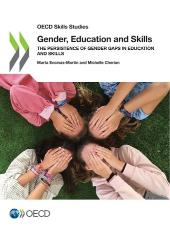 |
Gender, Education and Skills: The Persistence of Gender Gaps in Education and Skills
The 2023 Gender, Education and Skills Report on the persistence of gender gaps in education and skills presents fresh insights on progress towards gender equality in education. The report tries to understand why teen boys are more likely than girls, on average, to fail to attain a baseline level of proficiency in reading, mathematics and science, and why high-performing girls do not continue investing in developing skills in areas such as mathematics and science, when compared to high-performing boys. The report also describes that, despite overall gender gaps in mathematics and science being quite small, young women continue to be under-represented in STEM-related fields after leaving school. These career choices are also reflected in gender disparities in the labour market: tertiary-educated women earn 76% of the earnings of their male peers. This could be possible because men are more likely than women to pursue studies in fields associated with higher earnings, such as engineering, manufacturing and construction, and ICTs, while women still choose fields associated with lower earnings, including education, welfare, and arts and humanities.
» OECD Library
|
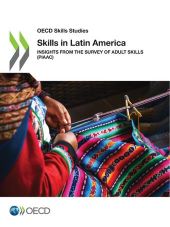 |
Skills in Latin America: Insights from the Survey of Adult Skills (PIAAC)
Human capital is a key determinant of success for individuals and economies alike. Literacy and numeracy are key foundations for higher-order cognitive skills, while solving problems in technology-rich environments is increasingly important, as information and communications technology (ICT) spreads into all aspects of life. Despite remarkable recent increases in enrolment and educational attainment, the countries of Latin America lag behind in skills development among both secondary school students and the wider adult population. Young adults are still struggling in the labour market, while employers report skill shortages are a barrier to business. As countries in the region seek to shift their economies into higher value-added activities to escape the “middle-income trap”, they will need to improve the skills of their working-age population across the board. This report explores the situation of youth and adults in Latin America by using data from the Survey of Adult Skills (PIAAC) from Chile, Ecuador, Mexico and Peru and the Programme for International Student Assessment (PISA) from Argentina, Brazil, Chile, Colombia, Costa Rica, the Dominican Republic, Mexico, Panama, Peru and Uruguay. These data have been supplemented by results from the World Bank STEP survey of adults living in urban areas of Bolivia and Colombia.
» OECD iLibrary
|
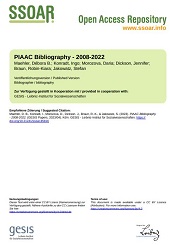 |
PIAAC Bibliography - 2008-2022 (GESIS Papers, 2023/04)
The present bibliography provides an overview of literature and data publications relating to the Programme for the International Assessment of Adult Competencies (PIAAC). Initiated by the Organisation for Economic Co-operation and Development (OECD), PIAAC assesses key cognitive skills (e.g., literacy and numeracy) and workplace skills of the adult population in over 40 countries.
The PIAAC Bibliography is a compilation of scientific publications relating to PIAAC. It includes (a) publications regarding the conceptual framework of the skill domains assessed in PIAAC; (b) publications of research results based on PIAAC data; (c) publications relating to the technical conception of the main study and/or follow-up studies; and (c) published PIAAC data files.
Since the first data release in 2013 the number of publications has constantly increased. The PIAAC Bibliography 2023 comprises 986 publications and 77 data sets (and 15 technical documents).
|
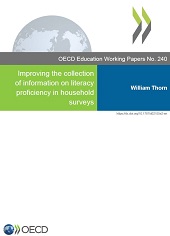 |
Improving the collection of information on literacy proficiency in household surveys (Education Working Papers, No. 240)
In the vast majority of the world’s countries, information on the literacy proficiency of the adult population is collected through census collections, labour force surveys or through omnibus household surveys. These commonly use simple measures: respondents’ reports of their own or other household members’ capacity to read and write or the capacity of the respondent to accurately read aloud a short sentence.
While there is a justified interest in the use of assessments to collect information regarding literacy proficiency, household surveys using simple measures will continue to be a primary source of data on literacy in many countries for some time. Improvement of the quality of simple measures should, therefore, be a priority. Three main avenues for improvement are identified: greater clarity regarding the concepts being measured, the development of improved simple direct assessments of literacy proficiency and encouragement for the use of a common set of instruments and questions.
» OECD iLibrary
|
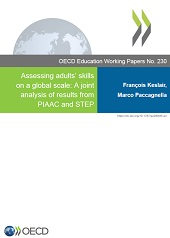 |
Assessing adults’ skills on a global scale : A joint analysis of results from PIAAC and STEP (Education Working Papers, No. 230)
This paper illustrates similarities and differences between two international surveys that assess adults’ skills: the Programme for the International Assessment of Adult Competencies (PIAAC) and the Skills Towards Employment and Productivity (STEP) survey. In particular, the paper highlights the issues that can arise for researchers interested to jointly analyse the data from the two surveys and to compare their results. The paper finds that, in spite of the many similarities, important differences exist between PIAAC and STEP, both in the way the data are collected, and in the way the proficiency of respondents is estimated. These issues can indeed affect the cross-country comparability of results from the two surveys. There is instead little evidence that the literacy assessment used in the two surveys is not adequate to form a basis for a valid assessment of adults’ proficiency on a global scale.
» OECD iLibrary
|
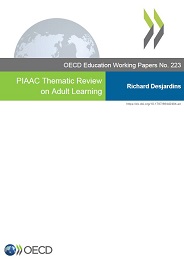 |
PIAAC Thematic Review on Adult Learning (Education Working Papers, No. 223)
This report focuses on the adult learning data that was collected as part of the OECD Survey of Adult Skills between 2012 and 2016, which has been a core activity of the ongoing OECD Programme for the International Assessment of Adult Competencies (PIAAC). The objectives are to: present the data on adult learning made available by PIAAC; provide an international and comparative overview of the extent of adult learning of different types along with trends, where possible, for countries and economies that have so far participated in PIAAC; reveal international and comparative patterns on the distribution of adult learning within participating countries and economies, focusing on who is and who is not participating in terms of the types of jobs they work in as well as their socio-demographic profile; assess empirically the relationship between some types of adult learning and economic as well as social outcomes; discuss systemic features of adult learning systems and their relationship with selected economic and social policy instruments; and to draw out implications of the results in relation to the continued measurement of adult learning.
» OECD iLibrary
|
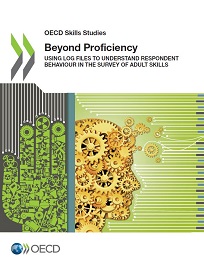 |
Beyond Proficiency - Using Log files to understand respondent behaviour in the Survey of Adult Skills
Computer-based administration of large-scale assessments makes it possible to collect a rich set of information on test takers, through analysis of the log files recording interactions between the computer interface and the server. This report examines timing and engagement indicators from the Survey of Adult Skills, a product of the Programme for the International Assessment of Adult Competencies (PIAAC), both of which indicate large differences across countries and socio-demographic groups, in the amount of time spent by respondents and their levels of disengagement, which reduce the probability of giving a correct answer and consequently reduces measured performance. Such insights can help policy makers, researchers and educators to better understand respondents’ cognitive strategies and the underlying causes of low and high performance. This, in turn, can help improve the design of assessments and lead to more effective training and learning programmes.
Adult Skills in Focus n°10:
How much time do adults spend on the PIAAC assessment and why does it matter?
Temps consacré par les adultes à l’évaluation PIAAC et importance de cette donnée
» Read the blog: "How computer-based tests are enriching education research"
» OECD ilibrary
|
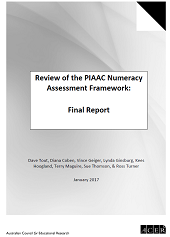 |
Review of the PIAAC Numeracy Assessment Framework: Final Report (by ACER)
The Programme for the International Assessment of Adult Competencies (PIAAC) is an international assessment of the proficiency of adults (aged 16-65 years) in key information processing skills (reading, numeracy and problem solving in technology-rich environments). The Survey of Adult Skills has revealed that a considerable number of adults in OECD countries possess only limited literacy and numeracy skills. The OECD is currently reviewing the content of the frameworks and cognitive assessment instruments for the 2nd cycle of PIAAC ready for delivery in 2021-22.
This report is the result of a review of the numeracy construct and assessment in PIAAC. It recommends a range of areas for potential improvements and enhancements, including of the definition and elaborations of adult numeracy used in the framework, and the assessment content. Many of the suggestions arise out of the concern that the existing framework and assessment do not reflect some of the realities of the skills and knowledge adults now need to succeed in work, life and citizenship in the 21st century.
The report also recommends the development of a PIAAC numeracy components assessment, which would have parallel aims to the existing reading components assessment, and provide insights into the skills and knowledge of the significant number of adults with low levels of numeracy.
|
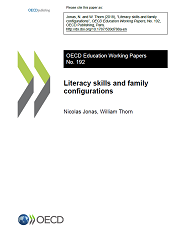 |
Literacy Skills and Family Configurations (EDU Working Papers No. 192)
We study the links between family configuration and formation on the one hand and adult literacy skills on the other by analysing data from the Programme for the International Assessment of Adult Competencies (PIAAC), a survey of 250 000 people aged 16 to 65 conducted by the OECD in 33 countries and economies. Literacy proficiency has an effect on many aspects of the formation and development of families, such as age of parents at birth of first child, or age of partners at cohabitation, even when educational attainment and age are taken into account. Moreover, having children and living with a partner have consequences for adults’ job opportunities and participation in the labour market, which can be particularly negative for the women with the highest literacy proficiency.
Adult Skills in Focus n°9:
Teenage parenthood: how does it relate to proficiency in literacy?
Devenir parent à l’adolescence : Quels liens avec le niveau de compétence en littératie ?
» Read the blog: "What is the relationship between literacy and single-parent families?" by Nicolas Jonas
» OECD iLibrary
|
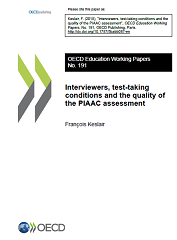 |
Interviewers, Test-taking Conditions and the Quality of the PIAAC Assessment (Education Working Papers, No. 191)
This paper explores the impact of test-taking conditions on the quality of the Programme for the International Assessment of Adult Competencies (PIAAC) assessment. Interviewers record information about the room of assessment and interruptions that occurred during each interview. These observations, along with information on interviewer assignment size and a careful look at interviewer effects, provide insights into the quality of the assessment. This working paper first describes the variations in test-taking conditions among participating countries. Second, it examines interviewer assignment sizes and the frequency of interruptions, finding that both vary markedly among countries (contrary to the room of assessment). The paper then looks at the relationship between these variations and response rates and engagement measures. While neither the room of assessment nor the recorded interruptions impact quality differences among countries, interviewer assignment size and interviewer effects may have a mild impact on results.
» OECD iLibrary
|
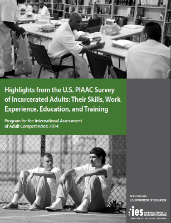 |
Highlights from the U.S. PIAAC Survey of Incarcerated Adults: Their Skills, Work Experience, Education, and Training
On February 22nd, the American Institutes for Research hosted a presentation and discussion on a recently released report using data from the Programme for the International Assessment of Adult Competencies (PIAAC). This report provided information on skills and competencies of the incarcerated adults, comparing to that of adults in U.S. households. The report also reported on the extent of inmates’ participation in formal education, empowerment classes (such as parenting or personal finance management), and job training programs.
|
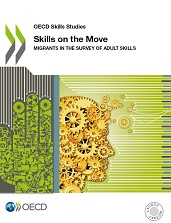 |
Skills on the Move: Migrants in the Survey of Adult Skills
Migration has been at the centre of political debate across the OECD in recent years. This report provides new evidence based on PIAAC data on differences in migrants’ characteristics and considers how these relate to the skills migrants possess. It also examines the relationship between migrants’ skills and their labour and non-labour market outcomes in host countries. Finally, it sheds new light on how migrants’ skills are developed, used and valued in host country labour markets and societies.
» OECD ilibrary
|
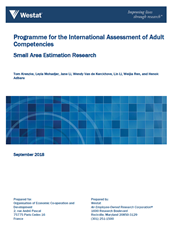 |
Small Area Estimation Research (by Westat)
The Programme for the International Assessment of Adult Competencies (PIAAC) sample is designed to produce internationally comparable and nationally representative direct estimates (based solely on survey data) with adequate levels of precision for the nations as a whole and for major population subgroups. However, the Organisation for Economic Cooperation and Development (OECD), and several of the participating countries in Cycle 1 of PIAAC, have expressed interest in using PIAAC data to create proficiency estimates for local areas where PIAAC sample size is too small (or equal to zero) to produce any direct estimates. Small area estimation (SAE) methods facilitate the estimation of the proficiency distribution in subpopulations not initially targeted in large scale surveys. This paper summarizes the research results from applying SAE methods using PIAAC data from five countries that participated in Cycle 1, with various core national sample designs.
|
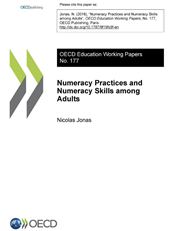 |
Numeracy Practices and Numeracy Skills among Adults (Education Working Papers, No. 177)
We assess the relationship between numeracy skills and numeracy practices among adults in everyday life and at work from the Survey of Adult Skills, a product of the Programme for the International Assessment of Adult Competencies (PIAAC), an international survey of about 250 000 adults aged 16-65 years old conducted by the OECD in 33 countries/economies. The level of proficiency and the intensity of engagement in numeracy practices are two embedded aspects of numeracy. Proficient adults use numeracy frequently and adults who regularly engage in numeracy practices improve their performance. Individual and contextual factors influence, in different ways across countries, the strength of these links. The intensity of the use of numeracy in everyday life decreases as the lapse of time since a person’s studies increases. Moreover, employed people engage in mathematical activities less in the private setting if they do not do so intensively in the workplace.
Adult Skills in Focus n°8:
Students’ numeracy skills and practices
Les compétences et les pratiques en numératie des étudiants
» Read the blog:"Being good at maths could be good for your health" by Nicolas Jonas.
» OECD iLibrary
|
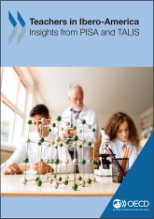 |
Teachers in Ibero-America - Insights from PISA and TALIS
This report uses the most recent OECD data, primarily from the PISA 2015 and TALIS 2013 cycles, and seeks to evaluate the Ibero-American teaching profession in support of policy makers across the region. It provides contextual evidence about the environment in which Ibero-American teachers work and develop, underlining the need for concerted support for teachers in the region. It provides a general overview of the teaching workforce in the Ibero-American countries, analysing the key characteristics of the region’s teachers and the extent of teacher sorting across schools and its relationship to equity in education.
English version | Spanish version
|
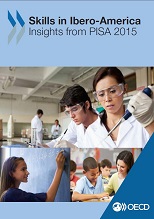 |
Skills in Ibero-America: Insights from PISA 2015 provides an overview of the main skills challenges facing Ibero-American countries and explores the following important and relevant questions for the skills and education systems in the region: What specific skills challenges are Ibero-American countries facing today? What are the similarities and differences in educational performance and skills amongst the countries? What accounts for differences in performance between Latin American countries compared to Spain and Portugal and how can this gap be closed? What are the main drivers of student performance? How do these skills challenges impact labour market outcomes?
English version | Spanish version
|
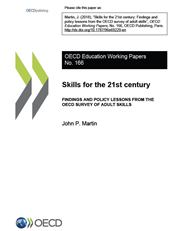 |
Skills for the 21st century: findings and policy lessons from the OECD Survey of Adult Skills (Education Working Papers, No. 166)
The OECD Survey of Adult Skills is the jewel in the crown of its Programme for the International Assessment of Adult Competencies (PIAAC). This paper argues that the findings and policy lessons from the project to date justify the high hopes which were placed in PIAAC when detailed planning for the project began in 2003. First, it presents a brief recap of PIAAC and its two predecessor international skills surveys. Second, it outlines the main themes which have been investigated to date using data from PIAAC. Third, the main findings and policy lessons drawn from PIAAC are highlighted. Finally, looking forward to the second cycle of PIAAC, for which planning is now underway, the paper suggests some priority areas for improvement to the survey design in order to add to its analytical usefulness and enhance its utility to policy makers.
» OECD iLibrary
|
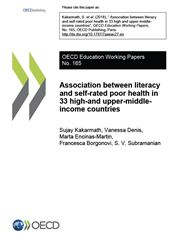 |
Association between literacy and self-rated poor health in 33 high- and upper-middle-income countries (Education Working Papers, No. 165)
We assess the relationship between general literacy skills and health status by analysing data from the PIAAC, an international survey of about 250 000 adults aged 16-65 years conducted by the OECD from 2011-15 in 33 countries/national sub-regions. Across countries, there seems to be a strong and consistent association between general literacy proficiency and self-rated poor health, independent of prior socio-economic status and income. General literacy proficiency also appears to be a mediator of the association between self-education and self-rated poor health. While the literacy-health association is robust over time, it varies in magnitude across countries. It is strongest for those with a tertiary or higher degree and does not appear to exist among young adults (ages 25 to 34 years). Future studies are required to understand the contextual factors that modify the general literacy proficiency-health association.
» OECD iLibrary
|
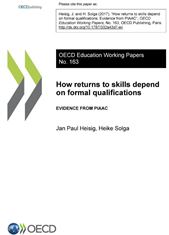 |
How returns to skills depend on formal qualifications - Evidence from PIAAC (Education Working Papers, No. 163)
Using PIAAC (Programme for the International Assessment of Adult Competencies) data for 21 countries, we study interrelationships between formal qualifications, cognitive skills, and labour market outcomes, focusing on comparisons between less and intermediate-educated adults (i.e. between adults with a degree below the upper secondary and at the upper secondary level). Less-educated adults tend to have lower cognitive skills than intermediate-educated adults, yet both groups are internally heterogeneous. In country-specific individual-level regressions, cognitive skills partly explain the lower occupational status of less-educated adults, but cross-national variation in their disadvantage remains substantial after accounting for skills.
» OECD iLibrary
|
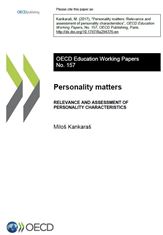 |
Personality matters: relevance and assessment of personality characteristics (Education Working Papers, No. 157)
This paper reviews the scientific literature covering a wide range of personality characteristics, discussing their conceptualisations and main features, their relevance for important outcomes in life and work, and the chief ways they are measured. It aims to provide a comprehensive overview of various attributes of personality from the perspective of their potential importance for the Survey of Adult Skills (PIAAC), taking into account their analytical potential and policy relevance. The paper also outlines and evaluates the most important measurement instruments for each personality characteristic, with a focus on short self-report scales as the most appropriate form for inclusion in large-scale international surveys. Finally, it presents some considerations related to the evaluation and promotion of personality characteristics and introduces the substantive and measurement criteria that could be used to select the personality attributes, and related measurement scales, to include in large-scale surveys.
» OECD iLibrary
|
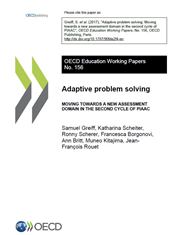 |
Adaptive problem solving: Moving Towards a New Assessment Domain in the Second Cycle of PIAAC (Education Working Papers, No. 156)
The set of skills that is required to be a successful citizen in the 21st century is rapidly evolving. New technologies and social systems grow increasingly complex and require individuals to quickly and flexibly adapt to new and changing circumstances. This paper outlines the key features of the domain of adaptive problem solving that is proposed to be assessed in the 2nd cycle of the OECD Survey of Adult Skills (PIAAC) in addition to the domains of numeracy and literacy. Adaptive problem solving is considered to be a crucial 21st century skill that combines cognitive and meta-cognitive processes. The paper develops a definition of adaptive problem solving building on relevant work in cognitive psychology and cognitive science, introduces its covariates and preconditions, discusses relevant assessment principles, and provides insights on the relevance of adaptive problem solving for labour markets and social integration.
» OECD iLibrary
|
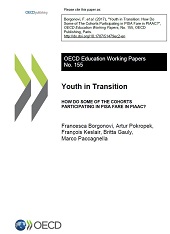 |
Youth in Transition: How do some of the cohorts participating in PISA fare in PIAAC? (Education Working Papers, No. 155)
This paper uses data from PISA and the OECD Survey of Adult Skills (PIAAC) to examine the evolution of socio-economic and gender disparities in literacy and numeracy proficiency between the ages of 15 and 27 in the sample of countries that took part in both studies.
Adult Skills in Focus n°5:
Do socio-economic disparities in skills grow between the teenage years and young adulthood?
Les écarts de niveau de compétences associés aux caractéristiques socioéconomiques se creusent-ils entre l’adolescence et le début de l’âge adulte ?
» Read the blog: “How inequalities in acquiring skills evolve”, by Francesca Borgonovi
» OECD iLibrary
|
 |
Measurement Properties of Non-cognitive Scales in the Polish Follow-up Study on PIAAC (POSTPIAAC) (Education Working Papers, No. 149)
There is a growing literature providing evidence that not only cognitive skills but also non-cognitive skills are important for economic and social outcomes. This paper assesses the measurement properties of the Big Five and Grit scales in a large representative sample of adults in Poland. The data from the Polish Follow-up Study on the Programme for International Assessment of Adult Competencies (postPIAAC) include longitudinal information on PIAAC respondents in Poland and additional background information not available in the international study.
» OECD ilibrary
|
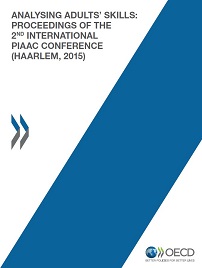 |
Analysing Adult's Skills: Proceedings of the 2nd International PIAAC Conference (Haarlem, 2015)
This volume collects a selection of papers from the 2nd PIAAC International conference, jointly organised by the OECD and the Dutch Government in November 2015 in Haarlem, the Netherlands. The three papers collected in this volume represent the work of scholars who were invited to present their work in the plenary session of the conference. The authors are all renowned scholars in their respective fields. Each of the papers represents an important contribution to the better understanding of issues of labour market and education policy that are at the centre of the policy concerns of many governments.
|
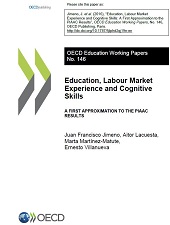 |
Education, Labour Market Experience and Cognitive Skills (Education Working Papers, No. 146)
This paper examines how formal education and experience in the labour market correlate with measures of human capital available in The Survey of Adult Skills, a product of the OECD Programme for the International Assessment of Adult Competencies (PIAAC). The findings are consistent with the notion that, in producing human capital, work experience substitutes formal education at the bottom of the schooling distribution. First, the number of years of working experience correlates with literacy proficiency only among low-educated individuals. Secondly, low-educated workers who only perform simple tasks on their jobs (calculating percentages or reading emails) do better in numeracy and literacy tests than similar employees who did not perform those tasks. Thirdly, workers in jobs intensive in numeric tasks perform relatively better in the numeracy section of the PIAAC test than in the literacy part. Overall, our results suggest that the contribution of on-the-job learning to skill formation is about a third of that of compulsory schooling in most of the countries that participated in PIAAC.
» OECD iLibrary
|
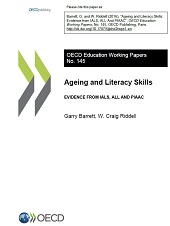 |
Ageing and Literacy Skills (Education Working Papers, No. 145)
This paper examines the relationship between age and literacy using data from the International Adult Literacy Survey (IALS), the Adult Literacy and Life Skills Survey (ALL) and The Survey of Adult Skills, a product of the OECD Programme for the International Assessment of Adult Competencies (PIAAC). A negative partial relationship between literacy and age exists with literacy declining with age, especially after age 45. However, this relationship could reflect some combination of age and birth cohort effects. The analysis shows that in most participating countries the negative literacy-age profile observed in crosssectional data arises from offsetting ageing and cohort effects. With some exceptions, more recent birth cohorts have lower levels of literacy and individuals from a given birth cohort lose literacy skills after they leave school at a rate greater than indicated by cross-sectional estimates. The results for birth cohort suggest that there is not a general tendency for literacy skills to decline from one generation to the next, but that the majority of the countries examined are doing a poorer job of developing literacy skills in successive generations.
» OECD iLibrary
|
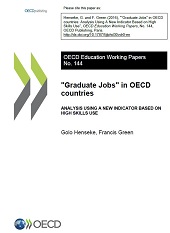 |
"Graduate Jobs" in OECD countries: Analysis Using A New Indicator Based on High Skills Use (Education Working Papers, No. 144)
A recurring issue for education policy-makers is the labour market effect of the long-term global mass expansion of higher education, particularly on what is a “graduate job”. The traditional assumption is that graduate jobs are virtually coterminous with professional and managerial occupations. A new indicator of graduate jobs, termed ISCO(HE)2008, is derived using task-based data drawn from the The Survey of Adult Skills, a product of the OECD Programme for the International Assessment of Adult Competencies (PIAAC). The new classification shows that several jobs in ISCO major group 3 “Technicians and Associate Professionals” are also classed as graduate jobs in many countries. Altogether, 27.6% of jobs are classified as graduate jobs in the 15 OECD country-regions for which we have data. Considerable variation in the proportion of graduate jobs is found across industries and countries and in the short period from 2011 to 2013, the proportion of graduate jobs has become more diverse across countries.
» OECD iLibrary
|
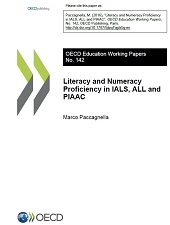 |
Literacy and Numeracy Proficiency in IALS, ALL and PIAAC (Education Working Papers, No. 142)
This paper analyses proficiency in literacy and numeracy in the countries that have participated in the International Adult Literacy Survey (IALS, administered between 1994 and 1998), the Adult Literacy and Life Skills Survey (ALL, administered between 2003 and 2007) and the Survey of Adult Skills (PIAAC, administered in 2012). While many countries experienced small to modest changes in literacy proficiency between IALS and PIAAC, others saw sizeable variations, mostly on the negative side.
» OECD ilibrary
|
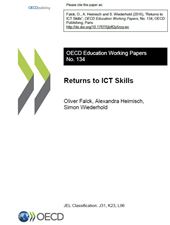 |
Returns to ICT Skills (Education Working Papers, No. 134)
How important is mastering information and communication technologies (ICT) in modern labour markets? We present the first evidence on this question, drawing on unique data that provide internationally comparable information on ICT skills in 19 countries from the OECD Programme for the International Assessment of Adult Competencies (PIAAC). Our identification strategy relies on the idea that Internet access is important in the formation of ICT skills, and we implement instrumental-variable models that leverage exogenous variation in Internet availability across countries and across German municipalities. ICT skills are substantially rewarded in the labour market: returns are at 8% for a onestandard- deviation increase in ICT skills in the international analysis and are almost twice as large in Germany. Placebo estimations show that exogenous Internet availability cannot explain numeracy or literacy skills, suggesting that our identifying variation is independent of a person’s general ability. Our results further suggest that the proliferation of computers complements workers in executing abstract tasks that require ICT skills.
» OECD iLibrary
|
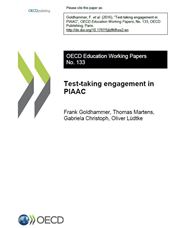 |
Test-taking engagement in PIAAC (Education Working Papers, No. 133)
In this study, we investigated how empirical indicators of test-taking engagement can be defined,empirically validated, and used to describe group differences in the context of the Programme of International Assessment of Adult Competences (PIAAC). The approach was to distinguish between disengaged and engaged response behavior by means of response time thresholds.
» OECD iLibrary
|
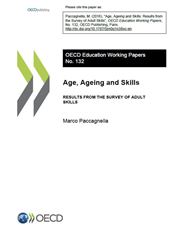 |
Age, ageing and skills: Results from the Survey of Adult Skills (Education Working Papers, No. 132)
This paper presents a comprehensive analysis of the link between age and proficiency in information-processing skills, based on information drawn from the Survey of Adult Skills (PIAAC). The data reveal significant age-related differences in proficiencies, strongly suggesting that proficiency tends to "naturally" decline with age. Age differences in proficiency are, at first sight, substantial. On average across the OECD countries participating in PIAAC, adults aged 55 to 65 score some 30 points less than adults aged 25 to 34 on the PIAAC literacy scale, which is only slightly smaller than the score point difference between tertiary educated and less-than-upper-secondary educated individuals. However, despite their lower levels of proficiency, older individuals do not seem to suffer in terms of labour market outcomes. In particular, they generally earn higher wages, and much of the available empirical evidence suggests that they are not less productive than younger workers. Older and more experienced individuals seem therefore able to compensate the decline in information processing skills with the development of other skills, generally much more difficult to measure. On the other hand, proficiency in information-processing skills remain a strong determinant of important outcomes at all ages: this makes it important to better understand which factors are the most effective in preventing such age-related decline in proficiency, which does not occur to the same extent in all countries and for all individuals.
Adult Skills in Focus n°3:
What does age have to do with skills proficiency?
Quel rapport entre l'âge et les compétences ?
OECD iLibrary
|
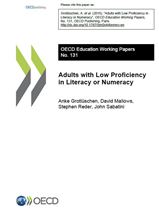 |
Adults with low proficiency in literacy or numeracy (Education Working Papers, No. 131)
This report offers a comprehensive analysis of the information from the Survey of Adult Skills (PIAAC) regarding adults with low literacy and numeracy proficiency. The report describes the demographic and socio-economic characteristics of these populations and explores the frequency with which they engage in the reading, writing and numeracy practices. Levels of engagement in these literacy practices are then related with a number of social and economic outcomes. Performance on the simple reading tasks (the so called “reading components”) of adults with low proficiency is also analysed as well as their participation rates in formal or non-formal adult education or training programmes.
 This report has been partly funded by the European Union. This report has been partly funded by the European Union.
Statistical Annex:
- Figures included in the Report and corresponding data
- Annex to Chapter 3 (Tables and Figures)
Adult Skills in Focus n°2:
What does low proficiency in literacy really mean?
Qu’entend-on réellement par faibles compétences en littératie ?
Read the blog: Making literacy everybody’s business, by Andreas Schleicher
OECD iLibrary
|
 |
The effects of vocational education on adult skills and wages (Social, Employment and Migration Working Papers, No. 168)
Vocational education and training are highly valued by many. The European Ministers for Vocational Education and Training, the European Social Partners and the European Commission have issued in 2010 the Bruges Communiqué, which describes the global vision for VET in Europe 2020. In this vision, vocational skills and competencies are considered as important as academic skills and competencies. VET is expected to play an important role in achieving two Europe 2020 headline targets set in the education field: a) reduce the rate of early school leavers from education to less than 10 percent; b) increase the share of 30 to 40 years old having completed tertiary or equivalent education to at least 40 percent. However, there is limited hard evidence that VET can improve education and labour market outcomes. The few existing studies yield mixed results partly due to differences in the structure and quality of VET across countries.
OECD iLibrary
|
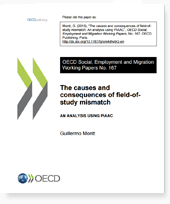 |
The causes and consequences of field-of-study mismatch: An analysis using PIAAC (Social, Employment and Migration Working Papers, No. 167)
Field‑of‑study mismatch occurs when workers educated in a particular field work in another. It is conceptually distinct from qualifications or skills mismatch, although a part of qualifications and skills mismatch results from graduates from a particular field having to downgrade to find work in another field. Some studies have identified labour market dynamics related to field-of-study mismatch, but few (if any) have sought to directly understand the interplay between labour supply factors (the types of skills brought to the workplace) and the labour demand factors (the types of skills demanded by employers) in field‑of‑study mismatch. Using data from the Programme for International Assessment of Adult Competencies’ Survey of Adult Skills (PIAAC), this paper shows that although students may choose to specialise in a particular field, it is not solely up to them to actually work in that field.
OECD iLibrary
|
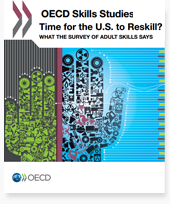 |
Time for the U.S. to Reskill? What the Survey of Adult Skills Says
Literacy and numeracy skills lie at the root of our capacity to communicate, live and work together, to develop and share knowledge. They matter for economic success and social well-being. This report draws on the new international OECD Survey of Adult Skills (PIAAC) to highlight the challenges faced by the United States. It shows that the United States should take action to improve adult skills, if it wants to avoid falling behind other countries. The report also advances a set of key recommendations to improve basic skills across the board.
OECD iLibrary
|
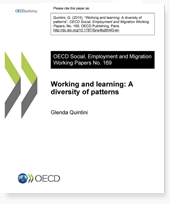 |
Working and learning: A diversity of patterns (Social, Employment and Migration Working Papers, No. 169)
The combination of work and study has been hailed as crucial to ensure that youth develop the skills required on the labour market so that transitions from school to work are shorter and smoother. This paper fills an important gap in availability of internationally-comparable data. Using the 2012 Survey of Adult Skills (PIAAC), it draws a comprehensive picture of work and study in 23 countries/regions.
OECD iLibrary
|
|
More publications
|
Skills and Wage Inequality: Evidence from PIAAC (EDU Working Paper No. 114)
This paper exploits data from the Survey of Adult Skills (PIAAC) to shed light on the link between measured cognitive skills (proficiency), (formal) educational attainment and labour market outcomes. After presenting descriptive statistics on the degree of dispersion in the distributions of proficiency and wages, the paper shows that the cross-country correlation between these two dimensions of inequality is very low and, if anything, negative. As a next step, the paper provides estimates of the impact of both proficiency and formal education at different parts of the distribution of earnings. Formal education is found to have a larger impact on inequality, given that returns to education are in general much higher at the top than at the bottom of the distribution. The profile of returns to proficiency, by contrary, is much flatter. This is consistent with the idea that PIAAC measures rather general skills, while at the top end of the distribution the labour market rewards specialised knowledge that is necessarily acquired through tertiary and graduate education. Finally, a decomposition exercise shows that composition effects are able to explain a very limited amount of the observed cross-country differences in wage inequality. This suggests that economic institutions, by shaping the way personal characteristics are rewarded in the labour market, are the main determinants of wage inequality.
» Read the blog
Comparison of PIAAC and PISA Frameworks for Numeracy and Mathematical Literacy (EDU Working Paper No.102)
This paper describes key aspects of the frameworks for the assessment of adult numeracy and mathematical literacy in PIAAC and PISA, which are OECD two flagship programs for international comparative assessment of competencies. The paper examines commonalities and differences in how the constructs of adult numeracy and mathematical literacy were assessed in PIAAC and PISA, and sketches selected challenges associated with interpretation of results from these surveys.
Skill Mismatch and Public Policy in OECD Countries (ECO Working Paper No.1210)
This paper explores the relationship between skill mismatch and public policies using micro data for 22 OECD countries from the recent OECD Survey of Adult Skills (PIAAC). Results suggest that differences in skill mismatch across countries are related to differences in public policies. After controlling for individual and job characteristics, well-designed product and labour markets and bankruptcy laws that do not overly penalise business failure are associated with lower skill mismatch.
Labour Market Mismatch and Labour Productivity: Evidence from PIAAC Data (ECO Working Paper No. 1209)
This paper explores the link between skill and qualification mismatch and labour productivity using cross-country industry data for 19 OECD countries. Utilising mismatch indicators aggregated from micro-data sourced from the recent OECD Survey of Adult Skills (PIAAC), the main results suggest that higher skill and qualification mismatch is associated with lower labour productivity, with over-skilling and under-qualification accounting for most of these impacts. A novel result is that higher skill mismatch is associated with lower labour productivity through a less efficient allocation of resources, presumably because when the share of over-skilled workers is higher, more productive firms find it more difficult to attract skilled labour and gain market shares at the expense of less productive firms. At the same time, a higher share of under-qualified workers is associated with both lower allocative efficiency and within-firm productivity – i.e. a lower ratio of high productivity to low productivity firms. While differences in managerial quality can potentially account for the relationship between mismatch and within-firm productivity, the paper offers some preliminary insights into the policy factors that might explain the link between skill mismatch and resource allocation.
The educational roots of trust (EDU Working Paper No. 119)
Trust is important for social and economic well-being, for enhancing social cohesion and strengthening resilience, and for maintaining security and order in our societies. Trust is the foundation upon which social capital is built and it also is intimately related to human capital. This work examines the association between education and levels of interpersonal trust, using data from the OECD’s Survey of Adult Skills (PIAAC). Our analysis demonstrated that education strengthens the cognitive and analytical capacities needed to develop, maintain, and (perhaps) restore trust in both close relationships as well as in anonymous others. It does so both directly, through building and reinforcing literacy and numeracy in individuals, and indirectly, through facilitating habits and reinforcing behaviours such as reading and writing at home and at work. Education and trust are thus fundamentally intertwined and dependent on each other. While all countries across the OECD have been striving to improve their education systems in terms of student achievement levels, this analysis suggests that there are also concrete elements that could be usefully addressed in order to reinforce and strengthen trust.
Skills and labour market performance in Sweden (ECO Working Paper No. 1233)
Both educational attainment and skills, as measured in the OECD Survey of Adult Skills (PIAAC), are high in Sweden. They are not perfect substitutes, but both are to some degree necessary for successfully integrating in the Swedish labour market. This paper describes the distribution of proficiency in literacy in the population and explores its determinants, and uncovers a strong relationship between literacy and the likelihood of being employed. The relationship between proficiency in literacy and the likelihood of participating in adult education is also explored. Lower employment prospects for immigrants are well explained by lower literacy proficiency, lower education and less favourable socio-economic backgrounds.
A new measure of skills mismatch: theory and evidence from the Survey of Adult Skills (PIAAC) (OECD Social, Employment and Migration Working Papers No.153)
This paper proposes a new measure of skills mismatch that combines information about skill proficiency, self-reported mismatch and skill use. The theoretical foundations underlying this measure allow identifying minimum and maximum skill requirements for each occupation and to classify workers into three groups, the well-matched, the under-skilled and the over-skilled. The availability of skill use data further permit the computation of the degree of under and over-usage of skills in the economy. The empirical analysis is carried out using the first wave of the OECD Survey of Adult Skills (PIAAC) and the findings are compared across skill domains, labour market status and countries.
Returns to Skills Around the World: Evidence from PIAAC (EDU Working Paper No.101)
Existing estimates of the labor-market returns to human capital give a distorted picture of the role of skills across different economies. International comparisons of earnings analyses rely almost exclusively on school attainment measures of human capital, and evidence incorporating direct measures of cognitive skills is mostly restricted to early-career workers in the United States. Analysis of the new PIAAC survey of adult skills over the full lifecycle in 22 countries shows that the focus on early-career earnings leads to underestimating the lifetime returns to skills by about one quarter. On average, a one-standard-deviation increase in numeracy skills is associated with an 18 percent wage increase among prime-age workers. But this masks considerable heterogeneity across countries. Eight countries, including all Nordic countries, have returns between 12 and 15 percent, while six are above 21 percent with the largest return being 28 percent in the United States. Estimates are remarkably robust to different earnings and skill measures, additional controls, and various subgroups. Intriguingly, returns to skills are systematically lower in countries with higher union density, stricter employment protection, and larger public-sector shares.
Ageing and Skills: A Review and Analysis of Skill Gain and Skill Loss Over the Lifespan and Over Time (EDU Working Paper No.72)
The relationship between ageing and skills is becoming an important policy issue, not least in the context of population ageing. Data from the Programme for the International Assessment of Adult Competencies (PIAAC) will potentially add considerably to the understanding of the relationship between ageing and foundation skills. In particular, the fact that data from the 1994-1998 International Adult Literacy Survey (IALS) and the 2003-2007 Adult Literacy and Lifeskills Survey (ALL) will be linked with PIAAC offers a unique opportunity to examine trends over time at the cohort level for a wide range of countries. Specifically, repeated measures will enable an analysis of whether there is skill gain and skill loss over the lifespan of cohorts and overtime between cohorts. This is especially important because age-skill profiles observed on the basis of a single cross-section are difficult to interpret. With this as a backdrop, this paper has sought to provide an overview of what is known about age-skill profiles and to conduct an analysis that demonstrates how trend data based on repeated cross-sectional observations of direct measures of skill at the cohort level can be used to estimate skill gain and skill loss over the lifespan and over time.
An Analysis of Skill Mismatch Using Direct Measures of Skils (EDU Working Paper No.63)
The focus of this study is on the potential causes of skill mismatch, the extent of skill mismatch, the sociodemographic make-up of skill mismatch, and the consequences of skill mismatch in terms of earnings as well as employer sponsored adult education/training. A distinction is made between skill mismatch and education mismatch. The analysis is based on the 2003-2007 Adult Literacy and Lifeskills Survey (ALLS) – a dataset similar to the one that is forthcoming from the Programme for International Assessment of Adult Competencies (PIAAC) in 2013. These studies contain direct measures of key foundation skills as well as measures of the use of certain generic skills at work which allow for a direct measure of skill mismatch. The analysis points to the complex ways in which mismatch is generated and the need for an accurate and up to date measure of mismatch, one that reflects the possibilities for skill gain and skill loss over the lifespan, and reflects differences in the quality of qualifications.
How Technology Changes Demands for Human Skills (EDU Working Paper No.45)
This paper places the competencies to be measured by the OECD’s Programme for the International Assessment of Adult Competencies (PIAAC) in the context of the technological developments which are reshaping the nature of the workplace and work in the 21st century. The largest technological force currently shaping work is the computer. Computers are faster and less expensive than people in performing some workplace tasks and much weaker than people in performing other tasks. On the basis of an understanding of the kinds of work computers do well, it is possible to describe the work that will remain for people in the future, the skills that work requires and the way that computers can assist people in performing that work. The paper argues that a technology-rich workplace requires foundational skills including numeracy and literacy (both to be tested in PIAAC), advanced problem-solving skills or Expert Thinking (similar to the construct of Problem Solving in Technology-Rich Environments to be tested in PIAAC) and advanced communication skills or Complex Communication (not being tested in PIAAC).
International Adult Literacy and Basic Skills Surveys in the OECD Region (EDU Working Paper No.26)
Both within and beyond the OECD region, governments and other stakeholders are increasingly interested in the assessments of the skills of their adult populations in order to monitor how well prepared they are for the challenges of the knowledge based society. The current paper provides an overview of the two international assessments of adult literacy which have already taken place in the OECD region – the International Adult Literacy Survey (IALS) and the Adult Literacy and Life Skills Survey (ALL) as well as of the OECD Programme for the International Assessment of Adult Competencies (PIAAC). The conceptual framework for the assessments is described with a focus on the links between the different assessments. In addition, the paper provides a survey of the outputs of IALS and ALL including a review of the major themes addressed in the literature which has used data from these surveys as well as a brief discussion of their policy impact.
Access to Education Over the Working Life in Sweden: Priorities, Institutions and Efficiency (EDU Working Paper No.62)
To facilitate individuals to adjust their skills to changes in market demands, Sweden has a relatively generous policy to stimulate formal adult education at the compulsory, upper secondary and tertiary levels. This paper provides an overview of what research has reported to assess if and/or how it may be an efficient use of tax payers’ money. Some institutional factors are also briefly presented to discuss what is likely to be required for such a policy to exist in a particular country.
Final Report of the Development of an International Adult Learning Module: Recommendations on Methods, Concepts and Questions in International Adult Learning Surveys OECD Education Working Paper No. 21 (EDU Working Paper No.21)
Policy interest in international surveys on Adult Learning (AL) has increased strongly. AL survey data are used as benchmarks for a country‘s educational system. However, results of key indicators like participation in learning activities often vary remarkably between different data sources. Stating that these differences are due to varying concepts and methods is not enough. The key question is: Which figures represent reality more appropriately? Therefore, evaluation of survey concepts and methods is crucial for international comparison of Adult Learning. This report provides guidelines on methodological and conceptual issues. Part one covers methodological aspects while part two deals with concepts, definitions and example questions. Recommendations are based on input from 14 countries.
Literacy for Life - Further Results from the Adult Literacy and Life Skills Survey
The Adult Literacy and Life Skills Survey (ALL) study builds on the International Adult Literacy Survey (IALS), the world’s first internationally comparative survey of adult skills undertaken in three rounds of data collection between 1994 and 1998. The foundation skills measured in the ALL survey include prose literacy, document literacy, numeracy,and problem solving. Additional skills assessed indirectly include familiarity with and use of information and communication technologies.This volume presents general findings for the complete group of eleven countries or regions that collected ALL data between 2002 and 2008 in two main waves of collection. Countries that participated in the first wave are: Bermuda, Canada, Italy, Norway, Switzerland, the United States and the Mexican State of Nuevo Leon. The countries that participated in the second wave are: Australia, Hungary, the Netherlands, and New Zealand.
Learning a Living - First Results of the Adult Literacy and Life Skills Survey
The fundamental goal of the Adult Literacy and Life Skills Survey (ALL) is to shed new light on the twin processes of skill gain and loss. This is achieved through measurement of prose and document literacy of adults for a second time in some countries. Further, the study has extended the range of skills measured by adding problem solving, numeracy and information and communication technology (ICT) skill. This allows one to examine the profiles of important foundation skills. Thus the study makes it possible, for the first time, to explore the interrelationships among skill domains as well as their links to major antecedents and outcomes, such as the quantity and quality of initial education and skill’s impact on employability, wages, and health.
Literacy in the Information Age - Final Report of the International Adult Literacy Survey
The study offers an understanding of the nature and magnitude of literacy issues faced by countries and explores new insights into the factors that influence the development of adult skills in various settings – at home, at work and across countries. The 20 countries represented account for over 50 per cent of the world’s entire gross domestic product. As such, the literacy data can contribute importantly to an understanding of the demand and supply of skills in the global, knowledgebased economy. The results confirm the importance of skills for the effective functioning of labour markets and for the economic success and social advancement of both individuals and societies. They offer policy makers a useful tool for policy analysis and for crafting policies and programmes that can contribute to economic and social progress.
Definition and Selection of Competencies: Theoretical and Conceptual Foundations (DeSeCo) - Background paper
The complexity of the demands generated by an increasingly interdependent, changing and conflictual world places the objectives of education and the strategies to achieve education goals in center stage of the debate on broad educational reform. In line with a growing concern about the adequacy and quality of education and training and the actual return on public educational expenditure, there has been since the mid-1980s an increased policy interest in comparable outcome indicators in the education field. In fact, measuring the quality of education outcomes, estimating economic and social returns to learning, and identifying key determinants to educational success is an ongoing discussion topic that stimulates keen interest around the world.
|
|






































 This report has been partly funded by the European Union.
This report has been partly funded by the European Union.